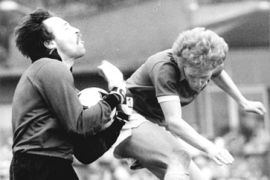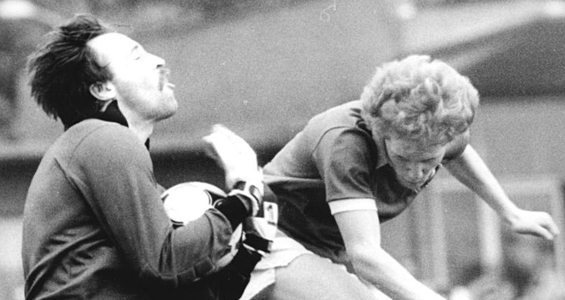Iron Union behind the curtain
Goalkeeper for ‘anti-Stasi’ team tells Al Jazeera about football behind the Iron Curtain.

 |
| Kult figure: Matthies claims the ball for the ‘Iron Union’ in the East German league in 1986 |
From its roots in the early 20th century as a Berlin metalworkers football club, 1.FC Union Berlin grew to become the “rebel” team in Stasi-controlled East Germany after the Second World War.
As direct rivals to Dynamo Berlin, the Union team faced sporting sabotage by their opponents’ owner – the notorious secret police chief Erich Mielke.
Support of the “Iron Union” was one of the few outlets for anti-government feeling in German Democratic Republic (GDR), even if it was largely veiled by terrace chants.
The club remains true to its roots, axeing a shirt deal at the start of the 2009/10 season because the sponsors’ chairman was a former Stasi agent.
Wolfgang Matthies, goalkeeper and kult-hero in the Stasi era, spoke to Al Jazeera as the current team push for promotion to the top tier of the German Bundesliga.
Al Jazeera: How did you come to join 1.FC Union Berlin?
Matthies: First I was transferred from my small club to a larger club, Vorwärts Berlin, but that club later had to move to Frankfurt an der Oder (a town in far eastern Germany).
I definitely wanted to stay in Berlin. At the age of 17 I finally joined Union Berlin – my favourite team anyway.
Did the club have a rebellious reputation at the time?
|
“A Dynamo player lost his shoe in the penalty area. He came to pick it up but I was faster and kicked it away like a free kick. Thirty thousand people were cheering” Wolfgang Matthies, 1.FC Union Berlin goalkeeper |
There were three famous clubs in East Berlin in those days. Vorwärts was run by the army, Dynamo (later Berliner FC Dynamo) was the Stasi team, and Union was the people’s club.
It was kind of rebellious already in its organisation structure. Therefore it attracted many people who had their own heads and minds about society.
What was the feeling in the dressing room towards Dynamo Berlin? And their involvement with the Stasi and with Erich Mielke?
We didn’t have any feeling towards them. Everyone knew what was wrong with them and that they’d get any possible advantage, even from the referees.
We didn’t mind, we just wanted to beat them in the matches.
Can you remember any particular stories about matches between the two sides?
Yes there are few of them. Once we had been promoted to the first division, we beat them twice in one season. Both pretty close matches with a 1-0 win for us.
In another match a Dynamo player lost his shoe in the penalty area. He came to pick it up but I was faster and kicked it away like a free kick. Thirty thousand people were cheering – it was great fun.
Is it true that Dynamo Berlin were able to gain an unfair advantage in the East German League because of Mielke’s influence?
Yes, that’s true. The referees had orders to let them win, if possible. The referees had their ways to do so – five or more minutes added time, maybe a penalty or not accepting a goal of the other team. It was kind of ridiculous.
It would seem there was little room for dissention from the established order in East Germany. Is this true?
You are right, there was no room for dissention. Union wasn’t a club of dissidents, but a home for what we’d now call alternative culture. They looked different, they tried to live a bit different. Union gave them the chance to express themselves in a more independent way of life.
Did you grow up with a national feeling of being East German? And what was your feeling towards the West of Germany?
| East Berlin glove story |
|
|
This was a bit special. I was born in 1953 and as most of the East German people I felt as a citizen of the GDR, not of Germany.
On the other hand we had very positive feelings towards the West. It sounds a bit strange, but that’s the way it was. Many of us still had relatives in the West.
My grandma and grandfather lived in the West and it was great to get presents from time to time. But still for me they lived in a different country.
What was the effect on football in East Germany of reunification? What was your feeling when the Berlin Wall came down?
When the Wall came down it was just pure joy. Personally I was one of the first who had a look a West Berlin, because I noticed already in the night of November 9 what had happened.
Most of the East Germans heard about it in the morning of November 10. I came back that morning and was one of very few people at work.
It was very good for everything. Sports in general and especially football is very connective and brings people together. The players had more chances now that the clubs had to struggle – like everyone had.
Did you and fellow East German footballers celebrate West Germany’s victory at Italia 1990?
Yes of course. We had very good feelings towards the West. In 1990 it was already our country and our team.
I read that the player Lutz Eigendorf was murdered after moving from Dynamo Berlin to Kaiserslautern in the West. Was there such a physical threat to East German players if they joined a West German team?
Yes, I heard about it too. I didn’t know him but we all knew he was assassinated by the Stasi. So it was with players who tried to move to the West. At Union Berlin we didn’t even think about it (moving away).
 |
| Matthies was one of the first GDR citizens to visit West Berlin in 1989 [Matthias Koch] |
Are there any remaining issues from pre-reunification that affect modern footballers from either side?
Not really. I mean it’s 20 years ago now, so there is nothing really left. Some things are presented as new inventions, like special schools for young players, to make the best possible combination of learning and training.
Every East German knows that we had those things already 30 years ago. But that’s the way it goes – everything is destroyed or blamed for being a bad thing. Then it’s brought back in with a new name and new clothes and suddenly is the “high end” of training science.
What did reunification mean for the club and did it affect your career?
The club was not in a very good position at that time and ended in the third division of German football.
After years of struggling and trying to reach a better level, Union at the moment is the most successful East German club.
For my career it was not so important, because I had finished with professional football already. But then it was funny for me; I was reactivated by a friend and had the chance to play for another two West Berlin clubs. Not at a very high level but in an interesting multicultural surrounding. That was something we did not have in the GDR.
Finally, do you believe sport in general in the former East and West Germany was politicised or used as propaganda?
Yes it was used as propaganda in East and West Germany, and also in the United States and United Kingdom. Maybe a little bit more in the eastern countries because of their economic difficulties. But in East German football it was not such a big thing, because we had not been very successful.
With thanks to Christian Arbeit at 1.FC Union Berlin.

 Wolfgang Matthies born July 17, 1953 in East Berlin.
Wolfgang Matthies born July 17, 1953 in East Berlin.